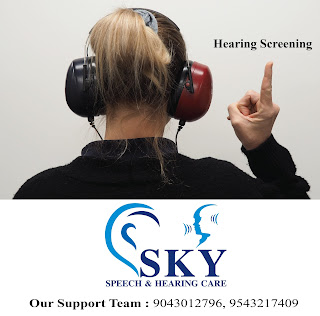Hearing screening refers to the process of identifying potential hearing problems in individuals who may not yet have noticed any issues with their hearing. The goal of hearing screening is to detect hearing loss early so that appropriate interventions and treatments can be provided to improve the individual's quality of life.
Here are some key points to increase awareness on hearing screening:
1. Importance of Early Detection: Early identification of hearing loss is crucial for proper intervention. Untreated hearing loss can lead to communication difficulties, social isolation, academic challenges (in children), and reduced overall well-being.
2. Target Populations: Hearing screenings are often targeted towards specific groups, such as newborns, infants, school-age children, and older adults. For newborns, it is typically conducted shortly after birth as part of a newborn hearing screening program.
3. Methods of Screening: Hearing screening methods vary depending on the age group being assessed. For newborns, auditory brainstem response (ABR) or otoacoustic emissions (OAE) tests are commonly used. In older children and adults, pure-tone audiometry is a standard method involving the use of headphones and tones at different frequencies.
4. Regular Check-ups: Regular hearing check-ups should be encouraged, especially for individuals with risk factors such as a family history of hearing loss, exposure to loud noises, certain medical conditions, or advanced age.
5. Role of Professionals: Hearing screenings are often conducted by healthcare professionals or trained technicians, such as audiologists, pediatricians, school nurses, or primary care physicians.
6. Follow-up and Referral: If a hearing screening indicates potential hearing loss, individuals should be referred to a specialist for further evaluation and appropriate management.
7. Hearing Protection: Raising awareness about the importance of protecting one's hearing from loud noises is also essential. Avoiding prolonged exposure to loud sounds and using hearing protection devices (such as earplugs or earmuffs) in noisy environments can help prevent hearing damage.
8. Impact on Quality of Life: Hearing loss can significantly impact an individual's emotional well-being, communication abilities, and social interactions. Raising awareness about these potential effects can encourage people to seek timely screening and intervention.
9. Hearing Loss and Communication: Understanding that hearing loss can affect communication and that there are various strategies (like sign language, hearing aids, cochlear implants, etc.) available to help improve communication for individuals with hearing loss.
Overall, creating awareness about the importance of hearing screening and early detection of hearing loss can lead to better outcomes for individuals with hearing impairment, allowing them to lead more fulfilling and connected lives.





No comments:
Post a Comment